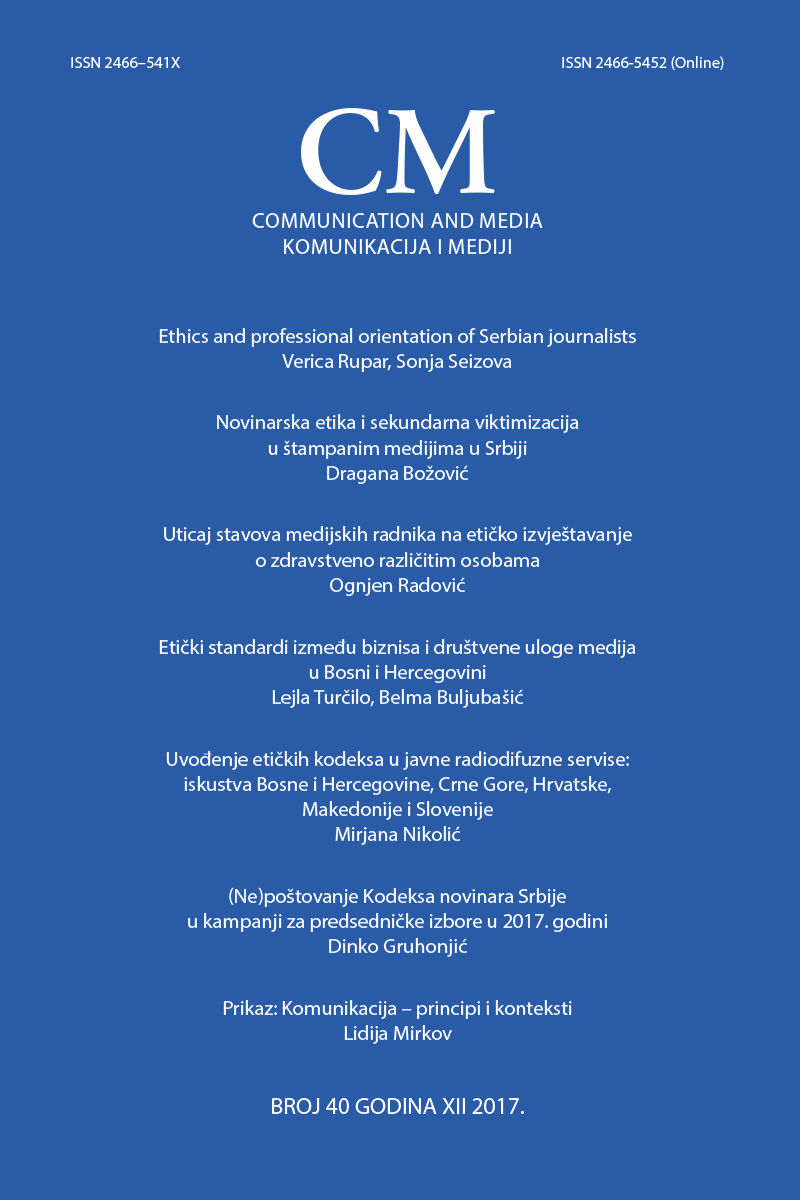INTRODUCING ETHICAL CODES IN PUBLIC BROADCASTING SERVICES - EXPERIENCE OF BOSNIA AND HERCEGOVINA, MONTENEGRO, CROATIA, MACEDONIA AND SLOVENIA
Abstract
Staring from the idea of self-regulation as the most optimal model of democratic and accountable regulation of the media sphere, especially in the field of electronic media, this paper provides a comparative analysis of norms and procedures pertaining to ethical issues in public broadcasting services, in the former Yugoslav republics, now sovereign Balkan states – Slovenia, Croatia, Bosnia and Herzegovina, Montenegro and Macedonia. One of the dilemmas which is discussed is whether the public service institutions should have their own ethical codes that define specific parameters and standards that are appropriate to this media model, or the existence of general codes of ethics is sufficient and applicable to PBS. The paper takes affirmative stance towards the existence of specific ethical codes of public broadcasting services that are in line with the specific social position and responsibility of these media towards the public, since this public is their founder, owner and controller. TV anchors, journalists, producers of commercial, public and civil media have very similar tasks, and are expected to be professional, unbiased, credible, accurate, non-manipulative, ethical, but people who work in public service institutions have a much greater responsibility that should be legislated with special laws and specialized ethical codes.
Copyright
Authors retain copyright of the published papers and grant to the publisher the non-exclusive right to publish the article, to be cited as its original publisher in case of reuse, and to distribute it in all forms and media.
Licensing
The published articles will be distributed under the Creative Commons Attribution ShareAlike 4.0 International license (CC BY-SA). It is allowed to copy and redistribute the material in any medium or format, and remix, transform, and build upon it for any purpose, even commercially, as long as appropriate credit is given to the original author(s), a link to the license is provided, it is indicated if changes were made and the new work is distributed under the same license as the original.
Users are required to provide full bibliographic description of the original publication (authors, article title, journal title, volume, issue, pages), as well as its DOI code. In electronic publishing, users are also required to link the content with both the original article published in CM: Communication and Media and the licence used.
Authors are able to enter into separate, additional contractual arrangements for the non-exclusive distribution of the journal's published version of the work (e.g., post it to an institutional repository or publish it in a book), with an acknowledgement of its initial publication in this journal.
Self-archiving policy
Authors are permitted to deposit author’s publisher's version (PDF) of their work in an institutional repository, subject-based repository, author's personal website (including social networking sites, such as ResearchGate, Academia.edu, etc.), at any time after publication.
Full bibliographic information (authors, article title, journal title, volume, issue, pages) about the original publication must be provided and links must be made to the article's DOI and the license.
Disclaimer
The views expressed in the published works do not express the views of the Editors and the Editorial Staff. The authors take legal and moral responsibility for the ideas expressed in the articles. Publisher shall have no liability in the event of issuance of any claims for damages. The Publisher will not be held legally responsible should there be any claims for compensation.

